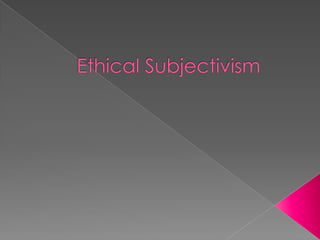
Ethical subjectivism
- 2. Background Russ Shafer-Landau is a professor of philosophy at the University of Wisconsin at Madison. He is the author of three books: Whatever Happened To Good And Evil?, The Fundamentals of Ethics, and Moral Realism: A Defence. Shafer-Landau is also the editor of the three volume series, the Oxford Studies in Metaethics. Russ Shafer-Landau 1963 - present
- 3. Ethical Subjectivism We’re going to be discussing two types of subjectivism: normative subjectivism and meta-ethical subjectivism. Even though these two views share the name ‘subjectivism’ they are very different. Be sure not to get them confused.
- 4. Normative Subjectivism As we’ve discussed before, normative ethical theories attempt to specify conditions under which an action is right or wrong. According to normative subjectivism, an act is morally right if, and only if, the person judging the action approves of it.
- 5. Normative Subjectivism Normative subjectivism allows that moral judgments can be true or false. There is truth in ethics, but no objective truth. A moral judgment is true just in case it accurately reports the sentiments of the speaker. Sincerity is the mark of ethical truth. If normative subjectivism is true, then one’s sincere moral judgments cannot be mistaken.
- 6. Normative Subjectivism When someone utters the phrase “Murder is wrong,” what they say is true if, and only if, they actually disapprove of murder. When someone utters the phrase “Murder is right,” what they say is true if, and only if, they actually approve of murder. In this case, if both speakers are honestly expressing their beliefs, then what each person says is true
- 7. Normative Subjectivism On normative subjectivism, some moral judgments can be false. A moral judgment would be false if the speaker who utters it is not honestly reporting his or her beliefs. For example, if one lies about what they approve or disapprove of, then they’re statement would be false. For example, if a man lies about his ethical views because he thinks that’s what his audience wants to hear, then what he has said is false.
- 8. An Argument for Normative Subjectivism The Argument from Disagreement: 1) There is persistent disagreement about moral matters, disagreement that cannot be rationally resolved. 2) The best explanation for such persistent, unresolvable disagreement is that there is no objective truth about moral matters. 3) Moral judgments can nevertheless be true or false. 4) Therefore, the truth or falsity of moral judgments is not objective, but depends on the attitudes of those making the judgments.
- 9. Objections to the Argument Most of the objections to this argument are going to focus on premise 2: the best explanation premise. One might think that the best explanation of moral disagreement is that we haven’t enough information to settle the issue yet. There was a time when people disagreed about the shape of the Earth, whether the Earth rotated around the sun or vice versa, and many other issues. Ethics, the objection goes, may be just like these disagreements. Other explanations?
- 10. Meta-ethical Subjectivism Meta-ethical subjectivism is not a normative view; it makes a claim about normative views. Meta-ethical subjectivism claims that normative ethical theories, and moral judgments in general, cannot be true. Note: meta-ethical subjectivism implies the falsity of normative subjectivism, and vice versa.
- 11. Meta-ethical Subjectivism According to meta-ethical subjectivism, the purpose of moral judgment is not to report personal or social attitudes, but rather to express one’s feelings or voice one’s commitments. For instance, when one says, “infanticide is wrong,” even though this looks like a statement that could be true or false, it is in fact just an expression of dislike or dissatisfaction with infanticide. It would be like saying “Boo infanticide” or “I don’t like infanticide.” These things can’t be true or false because emotive expressions and likes/dislikes can’t be true or false.
- 12. An Argument for Meta-ethical subjectivism The Argument from Moral Motivation: 1) Every moral judgment motivates all by itself. 2) Factual judgments cannot motivate all by themselves. 3) Therefore moral judgments are not factual judgments.
- 13. An Argument for Meta-ethical subjectivism Premise 1 claims that moral judgments are motivational. This means that to judge an action right is to be motivated to perform it. Similarly, to judge an action wrong, is to be motivated to not perform it. If one judges that eating animals is wrong, then such a person must be motivated to not eat animals.
- 14. An Argument for Meta-ethical subjectivism Premise 2 claims that factual judgments cannot motivate by themselves. This means that beliefs, in and of themselves, cannot move us to act. In order to act, we must be motivated by a desire of some sort. For example, we believe all sorts of mathematical, chemical, and physical propositions without be moved at all. And when we are moved by factual judgments it seems to be because there is also some accompanying desire.
- 15. Objections to the Argument Shafer-Landau notes that premise 2 is widely accepted as true, so most of the attack on this argument will be on premise 1. It’s open to objectors to claim that moral judgments are factual claims—claims that express beliefs—and so could be true or false AND not be able to motivate. How plausible is this idea?